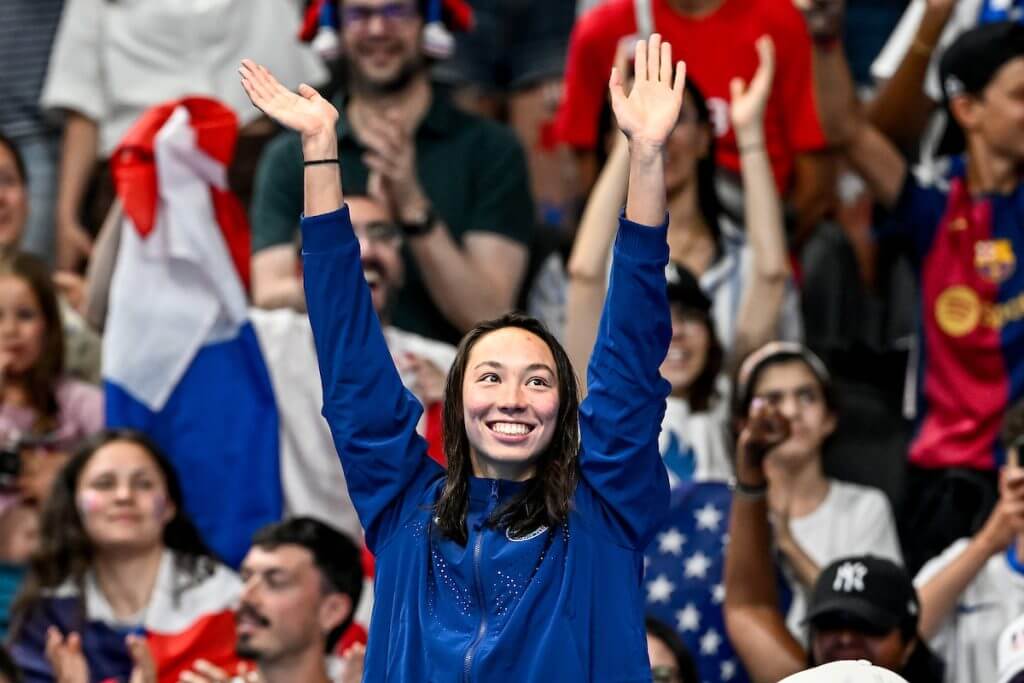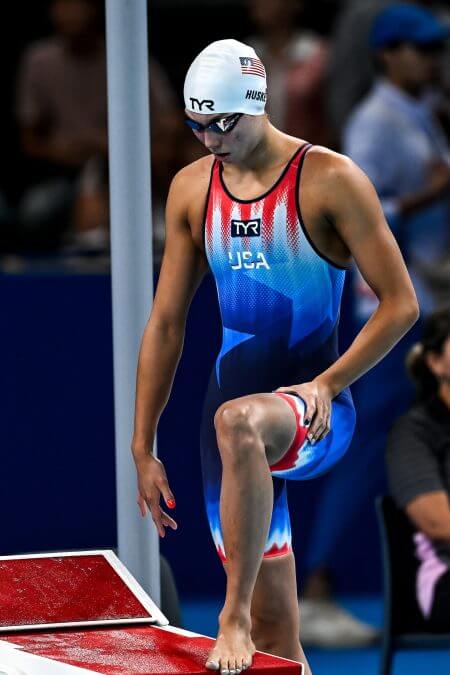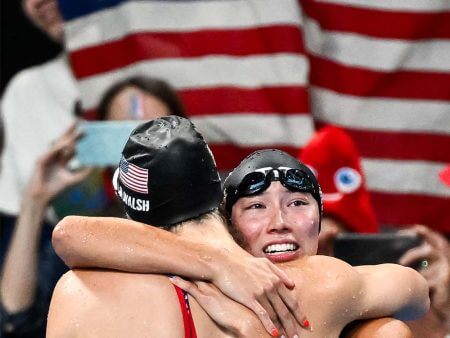How Torri Huske Rebounded From Disappointments to Win Gold, Become Multi-Event Star for U.S. in Paris

How Torri Huske Rebounded From Disappointments to Win Gold, Become Multi-Event Star for U.S. in Paris
Even on the occasions of her greatest triumphs, career-defining swims such as winning an Olympic gold medal, Torri Huske’s natural instinct is to deflect. The unassuming 21-year-old from Arlington, Va., credits her teammates at Stanford for “lifting her up,” and she acknowledges her coach, Greg Meehan, for crafting the plan that brought her to glorious heights in Paris.
The nine-day run that made her the winningest American swimmer at this year’s Games? Shout-out to the USA Swimming support staff that maximized recovery time and logistical efficiency. And her role anchoring the U.S. women’s 400 medley relay team to gold and a world record, becoming the first team ever to swim under 3:50? All about the first three legs. “You could have put pretty much anyone on that, and it would have been fine, just because they did such an amazing job and they set me up so well,” Huske said.
In the competition pool, though, Huske brings ferocity to races, mental toughness she has honed over the past four years of competing on the international level. That’s how she became an Olympian and an American-record holder at age 18 and a world champion a year later. It’s how she moved past a crushing fourth-place finish in her first Olympic final and returned to win gold in the same event four years later.
In Tokyo, Huske led the 100 butterfly final with 15 meters remaining, but Maggie Mac Neil, Zhang Yufei and Emma McKeon each had a little more closing speed to get to the wall ahead. In a field where the top four finishers were separated by less than two tenths, Huske was the unlucky contender to finish without a medal, one hundredth away from bronze.

Torri Huske — Photo Courtesy: Giorgio Scala / Deepbluemedia / Insidefoto
Three years later, the race brought a flash of déjà vu. Halfway down the final lap, American teammate Gretchen Walsh had taken the clear lead while Mac Neil and Zhang were both even and perhaps ahead of Huske. But then, the finish of a lifetime: Huske reeled in Walsh, pulling even in the final five meters and burying her head on the final five strokes to hit the wall four hundredths ahead.
“I saw the one light on the block, which meant I had won, and it was just a really surreal moment. And I feel like I’ve just been wanting this for so long. I’ve never wanted anything so bad in my life,” Huske said. “I believed I could do it, but it was just the fact that I’ve been wanting this moment for so long and thinking about it, and finally happening was just so surreal. I thought I was gonna start hyperventilating afterwards.”
Huske credited the Tokyo disappointment for providing perspective, teaching her the resilience she would need to come through in Paris. Had it not been for finishing fourth at the previous Games, Huske does not believe she would have secured gold this time around.
Her journey in the intervening three years had hardly been linear, however. Instead, Huske had built up a champion’s profile in 2022, winning six medals at the World Championships, only to fall flat the next summer. Just 367 days prior to Olympic glory, Huske had experienced a moment as low as any elite-level swimmer can imagine.
From ‘Traumatic’ 2023 to Paris Validation
At the halfway point of the 2023 World Championships final of the mixed 400 medley relay, China led the United States by a half-second. The butterfly leg, however, was a disaster for the Americans. Huske split 58.19, a whopping two-and-a-half seconds off her then-American record in the individual event, and the team faced a three-second deficit, with Australia also moving ahead of the U.S. team.
“I almost false-started,” Huske said. “I kind of just fell in, and then I freaked out and completely abandoned my race plan because I just wasn’t thinking, and I was freaking out in the beginning. I just spun it up and then died incredibly hard. So that was definitely a little traumatic.”
Individually, Huske had fallen to third in the 100 fly final, swimming almost a full second shy of her best time. After taking part in four medal-winning American relays at the 2022 World Championships, winning two golds, she did not swim another relay final in Fukuoka.
That experience forced Huske to examine what had gone wrong, and there was a clear culprit: an exceptionally heavy load of coursework had cut into her training the previous year. Meehan had seen his swimmer arriving at the pool late and exhausted, and he had adjusted practices accordingly. Huske believes that was the right decision, but it hampered her fitness later in the summer.
The results at Worlds reaffirmed Huske’s decision to take a gap year from NCAA swimming and from college entirely. “I was like, ‘I can’t even risk overloading myself this year. I really want to have that singular focus of just being really good in the water and really prioritizing my recovery,’” Huske recalled.
Her confidence was understandably shaken, though not in Meehan’s training regimen, and the two plotted a course for the Olympic year with Huske seeking every possible advantage. After her medley relay setback, she devoted time to relay starts at least once per week, even though skipping the college season deprived her of a chance to get any race practice before the Olympics. Meanwhile, even early in the season, Huske craved that competition as she sought to flush out the memories from Fukuoka.
“The World Cup, Berlin and then Athens, I think that helped me get back into racing mode, and it kind of helped me overcome my fear because I was racing so much,” Huske said. “And I think exposure is the best way to overcome something.”
Steadily, through her European World Cup swing, the U.S. Open and stops on the TYR Pro Swim Series, Huske improved, recording times in-season that eclipsed what she’d done in Fukuoka.
In June, she qualified for her second Olympic team despite racing in the fastest 100 fly domestic field ever assembled. Walsh broke the world record (and Huske’s American record) in the Trials semifinal while Regan Smith moved into the all-time top-five in the event. Huske eclipsed her lifetime best to secure her place in Paris.
The victory five weeks later meant validation: Huske and Meehan were correct that a few adjustments could put her back in position atop the world, and her trust in the longtime Cardinal coach paid off. The moment was plenty sweet for Meehan, too; numerous high-profile Olympians had departed Stanford for other programs in previous years, Smith included. But Huske had stayed the course. Shortly after Huske’s medal ceremony, she watched a video of Meehan breaking down in tears in the moments after she won gold.
“These past few years, I feel like we’ve both been through a lot,” Huske said. “So it was really nice to have him there by my side, supporting me through my full journey. And it was nice to see him get emotional, if I’m being honest, just because that moment really mattered to me too, and I definitely got emotional.”
Completing a Magical Olympics
Huske would not swim butterfly again in Paris after winning gold, only because her massive time drops in freestyle made her invaluable for the U.S. relays. After one day off, Huske returned to the pool for the individual 100 free, and she snuck into the final in the seventh position, with a poor finish in her semifinal heat costing her several places.
The field included two-time world champion Mollie O’Callaghan, Tokyo silver medalist Siobhan Haughey and world-record holder Sarah Sjostrom. But Huske knew she could sneak up on the favorites with proper execution.
“In the past, I’ve had a problem with just going out a little bit too hard,” Huske said. “It’s not necessarily too fast, just a little bit heavy on my legs. I rewatched my semi or my prelims race, and my legs were working a lot, so I didn’t have as much energy on the back half. I was like, ‘OK, I need to just trust my speed.’”

Torri Huske (left) with fellow 100 freestyle medalists Sarah Sjostrom and Siobhan Haughey — Photo Courtesy: Giorgio Scala / Deepbluemedia / Insidefoto
Indeed, she nearly stole away a second individual gold medal with a nearly perfect swim. Huske jumped on the race early and flipped first, extending her lead with her usual exceptional underwater. The field tightened down the stretch, but Huske’s magical Olympics continued with a silver, finishing behind Sjostrom but edging Haughey and O’Callaghan by hundredths.
“I knew it would be really difficult, but I did believe in myself,” Huske said. “ I believed I could win, and it’s fine that I didn’t. As long as you believe you can get way farther than anyone ever thought you could. And as happy as I am with my 100 fly, I’m honestly proud of that race and how I handled it and executed it, just because I feel like I finally have learned how to swim it, and I think I’m still getting more experience in that event. So it was really exciting to see that big time drop and know that I probably have some more in the future.”
Huske would conclude the Olympics with relay duty, in the mixed and women’s medleys. As the Olympic champion in the 100 fly, she would traditionally have handled that leg in both relays, but Walsh’s world record and Huske’s significant edge over the other freestyle options required a slight adjustment.
Smith, Lilly King and Walsh would give Huske a huge edge in the women’s event. The mixed relay was a nailbiter, arguably the top race of the Games, with Huske given a lead of just four hundredths on Zhang and China. In a sharp contrast from her most recent medley relay experience, Huske’s start was more than adequate. Her split was elite. At 51.88, she posted the fastest time in the race and the second-quickest of the entire Olympics. Most importantly, she held off China by 12 hundredths to secure gold.
“I feel like everyone just showed up that day,” Huske said. “We all did exactly what we had to, and going in, I think I had a little bit of a lead, and I was like, ‘I’m not gonna lose this for them. I can’t.’ I just felt so motivated and driven.”
A Winner and an Inspiration
By the end of the Games, Huske had collected five medals, tied with Smith for the most by an American athlete in any sport in Paris. Only Zhang, with six, had won more. Huske was one of 11 Olympians to win three or more gold medals, with her total matching fellow swimmers O’Callaghan and Summer McIntosh and American gymnast Simone Biles. Leon Marchand was the only individual to win more than three.
Her place among the world’s elite swimmers, in serious question after the previous disheartening summer, is very much restored.
“It was definitely very fortunate,” Huske said. “I put in a lot of work, and you never really know how the meet is gonna go exactly, but that was the goal at the end of the day. I haven’t fully processed it yet, just because it’s been so busy lately.”

Torri Huske (right) with Gretchen Walsh after winning Olympic gold in the 100 fly — Photo Courtesy: Andrea Masini / Deepbluemedia / Insidefoto
A whirlwind tour after the competition included another week and a half in Paris followed by vacation in Barcelona and a trip to London for a Taylor Swift performance. Huske spent a week at home in Virginia before returning to Stanford for a return to college life and college swimming. She has two years of eligibility remaining, with tentative plans to continue her education at Stanford after her 2026 graduation and continue training with sights on a home Olympics in 2028.
Prior to the Games, Huske received a fraction of the attention of some of her American teammates, many riding the wave of flashy accomplishments at Worlds in 2023 or in the 2024 college season. Huske was content to progress behind the scenes. in the preceding year as Huske quietly made progress. Now, she takes the deserved center-stage position.
As a teenager, she watched Katie Ledecky and Maya DiRado, both Stanford greats of an earlier generation, win gold. When DiRado capped her swimming career with Olympic gold in the 200 back at the 2016 Games, Huske thought, “She’s everything I want to be.” It helped “light the spark” on Huske’s own elite career.
Now, Huske has reached that same golden position, where she can be a powerful influence for young swimmers. That includes a recent visit to her old elementary school. It’s perhaps the most fulfilling offshoot of her successful second Olympics.
“It’s really cool knowing how many people care about this,” Huske said. “There’s been quite a few random people who will stop me and be like, ‘Oh my God. You’re really inspiring.’ And I think it’s just really cool knowing that I’ve made a little bit of a difference, that I’ve inspired some people, especially kids.”




I love this! THIS IS SO INSPIRATIONAL AND MOTIVATING!!!!